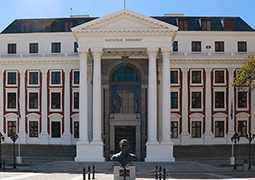
The National Assembly hosted a debate on illegal mining activities and associated crimes, focussing particularly on the threat these activities pose to state security and economic recovery.
In his opening remarks, African National Congress MP Mr Mikateko Mahlaule referred to those who have linked state corruption with the state’s failure to stamp out these illegal activities. He said this was a “false narrative” that is getting in the way of finding policy solutions to the problem. He went on to say that South Africa loses well over R4 billion every year due to illegal mining, costing the country as much as it spent on constructing the Medupi and Kusile power stations. It is therefore imperative for stakeholders to cooperate and promote investment in small-scale mining activities, as a means to curb illegal mining and ensure that everyone engaged in mining operates within the prescripts of a legal framework.
The Democratic Alliance’s Mr James Lorimer pointed out that illegal mining activities have increased significantly and its adverse impacts have been brought to everyone’s attention by the gruesome crime that took place in Krugersdorp recently. Illegal mining now flourishes due to a lack of proper policing and its costs billions every year to combat the theft of copper and other infrastructure. He recommended drafting legislation that will enable government to prosecute those involved in this activity and a specialised unit with the knowledge and prosecutorial skills to bring the perpetrators to book.
The risk of illegal mining to our national security, to loss to revenue, to exports earnings and procurement risks the stability of the industry and undermines economic recovery, said ANC MP Mr Albert Seabi. The complex web of illegal activities undermines the Economic Reconstruction and Recovery Plan and action from the police is needed to rectify the situation.
Ms Phiwaba Madokwe, an Economic Freedom Fighters MP, said that the Human Rights Commission has made several recommendations on how to deal with the matter, but to date the government has not given any consideration to them. One of the recommendations is to explore artisan mining as an employment generator in a country with high unemployment. Another recommendation is to learn more about the illegal trade’s value chain, how gold is moved across the border, where is it sold and how it gets to the legal market.
“We keep on focusing on the small fish, when it’s the big fish of legal mining that is hurting this market. That is involved in illegal mining. As a result, the revenue of this industry is now lost to international syndicates.”
Mr Mkhuleko Hlengwa, an Inkatha Freedom Party MP, mentioned the danger communities face due to exposure to the environmental waste that emanates from abandoned mines. This is the case because there’s no legislation to deal with it, he said.
African Christian Democratic Party MP Mr Wayne Thring refered to allegations that illegally mined minerals are sold to the United Arab Emirates and Switzerland. We should be naming and shaming countries involved in this activity, he said. As an indication of how dangerous to state security the situation has become, Mr Thring recounted how in June this year, illegal mining syndicates threatened to take control of Sibanye Mine and the mine was forced to retaliate.
It’s time for the Southern African Development Community and the African Union to debate the effects of illegal migration on the economy of South Africa, proposed Mr Nqabayomzi Kwankwa, on behalf of the United Democratic Movement. He also claimed that illegal mining and illegal migration are intimately connected and both should have been stamped out a long time ago. SADC and the AU must now find a lasting solution to the problem, he said.
Mr Vuyolwethu Zungula on behalf of the African Transformation Movement agreed on the link between illegal mining and illegal immigration. South Africa “can’t be a preferred destination for criminality, for drug smuggling, human trafficking, heists and now illegal mining by foreign nationals.”
The Minister of Minerals Resources and Energy, Mr Gwede Mantshe, explained that illegal mining is a function of illicit financial flows and is quite distinct from artisan mining, which is a “formal activity undertaken by citizens”. The government’s response to the problem thus far has been to shut down the existing open holes of derelict mines. To date, three mines have been rehabilitated, but the state can only seal 40 holes per year, meaning that it will “take years to seal all the existing mine holes”.
The government has asked mining companies to rehabilitate their mines concurrently as they continue to mine. But, many do not comply with this request. The government has also set up a multidisciplinary unit with the police and Department of Home Affairs to deal with this matter. “We are working closely with all other stakeholders to design it to bring an end to this illegality. The recent arrests by police shows that our cooperation is bearing fruits and is an effective way of dealing with this existential threat to our mining sector,” he said.
Abel Mputing
9 September 2022

